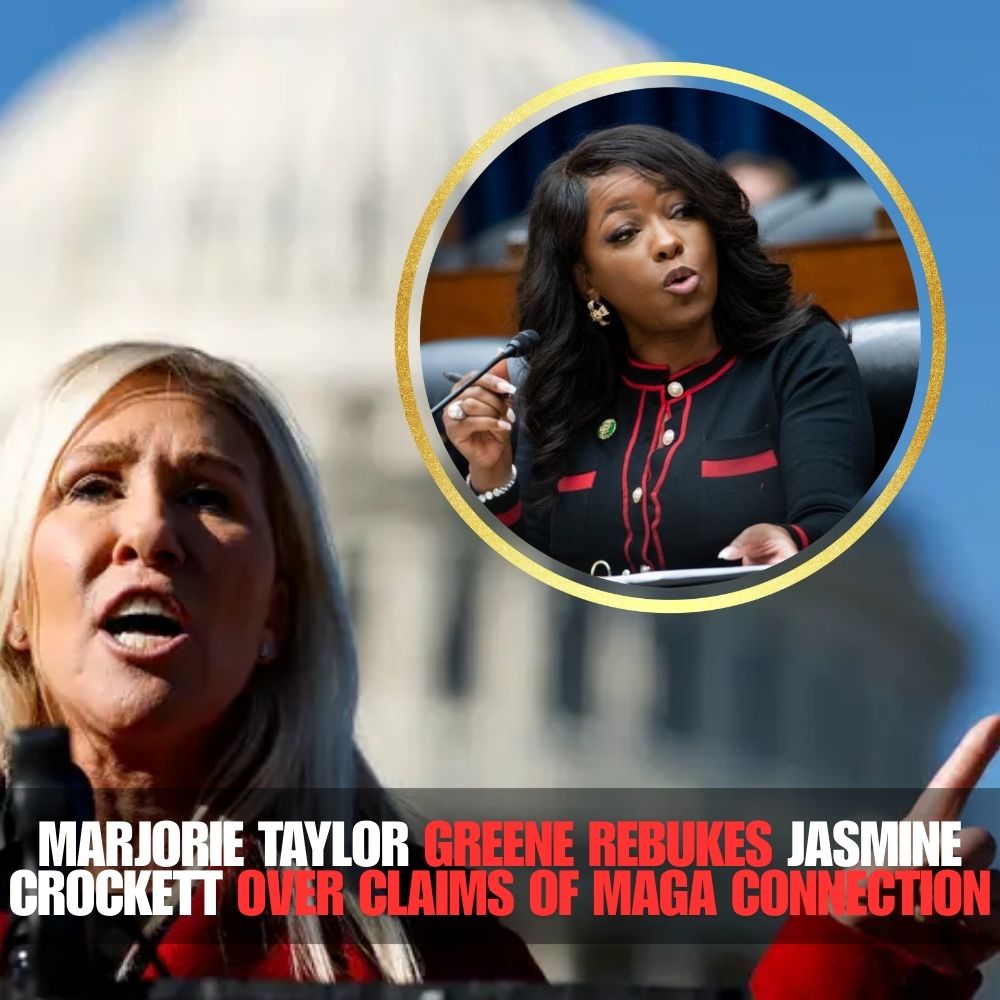Marjorie Taylor Greene Rebukes Jasmine Crockett Over Claims Of MAGA Connection

A heated exchange between Representatives Marjorie Taylor Greene of Georgia and Jasmine Crockett of Texas has drawn national attention, highlighting once again the sharp partisan divides in Congress over narratives related to political identity, extremism, and media framing.The clash centered on the background of Tyler Robinson, a figure whose political affiliations have become a source of controversy following references to him in congressional discussion.The confrontation began when Crockett pointed to an online news reference suggesting that Robinson’s family leaned heavily toward MAGA politics.
Greene, known for her fiery rhetoric and uncompromising style, shot back swiftly and forcefully, rejecting any attempt to link Robinson to the MAGA movement. Instead, she painted an entirely different picture of his affiliations, one she argued was diametrically opposed to conservative values.According to the record of discussion, Crockett remarked, “Looks like Yahoo News. It says, Charlie Kirk suspects Grandma says family is all MAGA.” The statement was meant to underscore a perceived alignment between Robinson and conservative politics, echoing sentiments that have surfaced in certain media reports.Greene immediately objected. “His family may be Republican, but all of the evidence that is being presented proves that he is a far-leftist, very much integrated in online groups that are linked to Antifa,” she declared.Greene went further, delving into Robinson’s personal life in terms likely to provoke controversy. “He was in a relationship with a biological male… so-called furry, whatever that is, that is transitioning to be a fake woman,” she said.
Her words underscored her effort to distinguish Robinson from any association with MAGA and instead emphasize ties to progressive or far-left subcultures. “He was not MAGA, not one bit, that is a complete lie, and it’s an insult,” Greene concluded.
This verbal sparring between Crockett and Greene is about more than one individual. It reflects a broader battle over political branding and the desire to control narratives about extremism and responsibility.For Democrats like Crockett, tying figures accused of instability or violence to MAGA creates a narrative that the conservative movement fosters extremism.For Republicans like Greene, pushing back is essential to protect the image of their base and to shift blame onto leftist movements like Antifa.In the polarized environment of Congress, even a single person’s political background can become a flashpoint. Each side seeks to weaponize the narrative to advance broader arguments about the state of American politics.
For Greene, the stakes are high because allowing any implication that Robinson was MAGA would bolster claims that conservative rhetoric fuels dangerous behavior.Greene’s comments reveal a calculated strategy. By acknowledging that Robinson’s family may have Republican ties, she inoculates herself against charges of denial.But by forcefully asserting that Robinson himself was aligned with leftist groups, she flips the narrative, suggesting that political violence is not a right-wing problem but a left-wing one.Her invocation of Antifa reflects a longstanding Republican talking point. For years, conservative leaders have accused Antifa of infiltrating protests, inciting violence, and spreading far-left ideology through online networks.
By placing Robinson within this framework, Greene seeks to reframe the conversation from MAGA extremism to leftist extremism.Her reference to Robinson’s relationship and identity issues serves a dual purpose. It underscores the cultural divides that Republicans often highlight in their critiques of progressive politics, while simultaneously distancing Robinson from conservative values.By describing him as being in a relationship with “a biological male” and a “so-called furry” transitioning to “a fake woman,” Greene employs language designed to resonate with her conservative base, which often views such cultural identifiers as alien to their worldview.For Jasmine Crockett, the decision to highlight Robinson’s family background as MAGA-linked reflects a different strategy. In political messaging, connecting figures to the MAGA label serves as shorthand for suggesting an alignment with Trump-era conservatism, a movement Democrats often portray as dangerous and destabilizing.
Crockett’s reference to “Yahoo News” gave her argument the appearance of being grounded in reporting rather than speculation. By citing an outlet and invoking Charlie Kirk’s commentary, she sought to tether Robinson to a recognizable conservative ecosystem.Yet her approach also invited backlash. Greene’s forceful response highlights the risks of making claims without airtight evidence, especially when they touch on highly contested political identities.For Democrats, the danger lies in appearing to overreach, thereby allowing Republicans to flip the narrative and claim victimization.This exchange comes at a time when both parties are increasingly eager to shape narratives about political violence and extremism. Republicans argue that left-wing movements such as Antifa pose the greatest threat to social order, while Democrats emphasize the dangers of MAGA extremism, often linking it to incidents of unrest or threats against public officials.